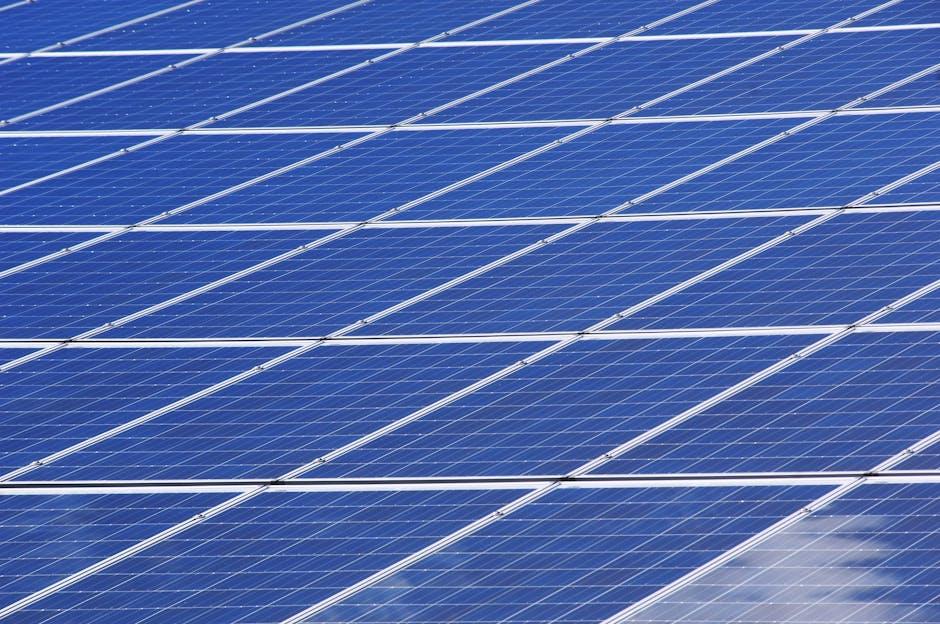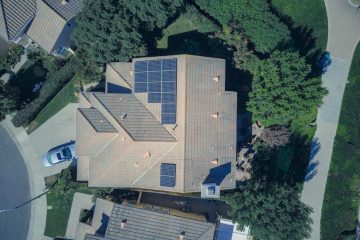Table of Contents
- Benefits of Installing Solar Panels in Your Home
- Understanding the Different Types of Solar Panels Available
- Key Factors to Consider Before Making a Purchase
- Maximizing Your Solar Investment with Government Incentives
- Maintenance Tips to Ensure Longevity of Your Solar System
- Q&A
- The Conclusion


Benefits of Installing Solar Panels in Your Home
Homeowners are increasingly discovering the array of advantages that come with solar panel installation. One of the most appealing benefits is the significant reduction in electricity bills. With the ability to generate your own clean energy, you can offset your reliance on grid power, which often translates to substantial savings over time. Depending on your location, solar energy systems can provide enough power to cover a large portion, or even all, of your household energy needs.
Installing solar panels also contributes to environmental sustainability. By harnessing solar energy, you are playing an active role in reducing greenhouse gas emissions, which is vital in the fight against climate change. Moreover, utilizing renewable energy sources helps preserve natural resources for future generations. This commitment to sustainability often aligns with the values of eco-conscious homeowners who prioritize green living.
Furthermore, the installation of solar panels can increase the resale value of your home. Many homebuyers are looking for energy-efficient options, and properties equipped with solar energy systems are often seen as more attractive. Studies have shown that homes with solar panels can sell for a premium compared to similar homes without them. This makes solar energy not only an investment in your current budget but also a smart move for your home’s future value.


Understanding the Different Types of Solar Panels Available
When exploring solar panels for residential use, it’s essential to understand the three main types available on the market today. Each type has unique features, efficiencies, and costs that can greatly influence your choice, depending on what fits best with your home and energy needs. The most common categories include monocrystalline, polycrystalline, and thin-film solar panels.
Monocrystalline solar panels are renowned for their high efficiency and longevity. Made from a single crystal structure, these panels tend to occupy less space and produce more electricity compared to their counterparts. While they often come with a higher price tag, their superior performance and aesthetic appeal make them a popular choice for homeowners looking for long-term investment in renewable energy.
On the other hand, polycrystalline solar panels are made from multiple crystal structures, which results in a slightly lower efficiency rate. However, they come at a more affordable price point, making them an attractive option for budget-conscious consumers. Lastly, thin-film solar panels are typically lightweight and flexible, making them suitable for various applications beyond rooftops, such as building-integrated photovoltaics. They may offer lower efficiency and require more space, but their unique properties allow for innovative installations.
Key Factors to Consider Before Making a Purchase
When considering the investment in solar panels for your home, it’s crucial to evaluate several essential elements that will influence your decision and experience. First, assess your energy needs by taking a close look at your current electricity consumption. This information will guide you to determine the appropriate size and capacity of the solar system required for optimal performance. Keep in mind that different households may have unique energy profiles, so tailoring your solar solution to your specific needs is vital.
Another critical factor is the cost of installation versus long-term savings. While the upfront expenditure can be significant, it’s important to calculate potential savings on your electricity bills over time. Research available incentives and rebates that could alleviate some of the initial investment. Additionally, consider financing options – many providers offer plans that can help you spread out the costs while still enjoying the benefits of renewable energy.
do not overlook the importance of researching reputable solar providers. Look for companies with strong reviews, proven track records, and robust warranties for their products. Evaluate their installation process, customer service, and post-installation support. A reliable provider not only ensures a high-quality installation but also provides ongoing maintenance, which is crucial for the long-term efficiency and durability of your solar panels.


Maximizing Your Solar Investment with Government Incentives
Investing in solar panels for your home can significantly reduce energy bills and increase property value. However, one of the most significant advantages lies in leveraging government incentives designed to support renewable energy initiatives. These programs can considerably lower the overall cost of installation, making solar energy even more accessible to homeowners.
Key incentives to consider include:
- Federal Investment Tax Credit (ITC): Homeowners can receive a tax credit of up to 26% of the solar installation costs, which decreases gradually in subsequent years. This substantial deduction can make a lasting impact on your return on investment.
- State Rebates: Many states offer cash rebates that can further reduce installation costs. Each state has different programs, so it’s essential to research what’s available in your area.
- Renewable Energy Certificates (RECs): Homeowners can earn RECs for every megawatt-hour their solar panels produce, which can then be sold for supplemental income.
To maximize your investment, consider also some local incentives that may be available, such as:
| Incentive Type | Details |
|---|---|
| Property Tax Exemption | Exempt renewable energy systems from property tax assessments. |
| Net Metering | Allows homeowners to sell excess energy back to the grid, offsetting costs. |
| Low-Interest Loans | State programs that offer financial loans at lower interest rates for solar installations. |
By carefully navigating these incentives, homeowners can significantly enhance the financial feasibility of solar panel installations. Taking advantage of these programs not only maximizes savings but also contributes to a more sustainable future. Make sure to consult with local solar installers who are familiar with the incentives specific to your region, ensuring you get the most out of your solar investment.


Maintenance Tips to Ensure Longevity of Your Solar System
To keep your solar system running efficiently and effectively, regular maintenance is key. Start by performing visual inspections at least twice a year. Look for signs of wear and tear, such as cracked panels or loose wiring. Additionally, ensure that there are no obstructions, like branches or debris, blocking sunlight from reaching your panels. Regularly cleaning your panels can also make a significant difference, especially in areas with high dust or bird activity where dirt can accumulate and reduce efficiency.
Another important aspect of solar system maintenance is monitoring the performance of your system. Use a solar monitoring system to keep track of energy production in real-time. If you notice any sudden drops in production, it could indicate a problem. Keeping a log of your energy output can help you identify issues early on, allowing for prompt repairs. Remember, a well-performing solar system not only saves you money but also extends its lifespan.
scheduling professional inspections at least once a year can help catch potential problems before they become major issues. Certified technicians can conduct thorough checks of your inverter, wiring, and overall system integrity. Consider maintaining a maintenance log that tracks all inspections, cleaning, and repairs performed. This will not only serve as a documentation of care for your own peace of mind but can also be a valuable selling point if you decide to sell your home in the future.
Q&A
Q&A: Understanding Solar Panels for Houses
Q1: What are solar panels, and how do they work in residential settings? A: Solar panels are devices that convert sunlight into electricity. They consist of photovoltaic (PV) cells that absorb sunlight, creating an electrical current. In residential settings, these panels are typically installed on rooftops or in open yards, allowing homeowners to harness solar energy to power their homes, reduce electricity bills, and contribute to a more sustainable environment.Q2: What are the benefits of installing solar panels on my house? A: Installing solar panels offers numerous advantages. Firstly, they can significantly lower your electricity bills by generating your own power. Additionally, many governments provide tax incentives and rebates for solar installations, making them a more affordable option. Solar panels also increase property value, offer energy independence, and reduce your carbon footprint, contributing to a cleaner planet.
Q3: Are there any downsides to using solar panels? A: While there are many benefits, some downsides may include the initial costs of purchasing and installing solar panels, which can be substantial. Additionally, solar energy production can be less effective on cloudy days or in areas with limited sunlight. If you move frequently, the return on investment may be less favorable. It’s crucial to evaluate your situation and conduct a cost-benefit analysis.
Q4: How much do solar panels cost, and what factors influence pricing? A: The cost of solar panel systems varies widely but generally ranges from $15,000 to $30,000 before incentives. Factors influencing pricing include the size of the system, efficiency of the panels, installation complexity, and location. Local incentives or financing options can also affect the overall cost, so it’s worth researching available programs in your area.
Q5: How long does it take for solar panels to pay for themselves? A: The typical payback period for solar panels is between 5 to 15 years, depending on several factors such as system cost, local electricity prices, and the efficiency of your solar installation. After this period, homeowners can enjoy free energy for many years, as solar panels usually have a lifespan of 25 years or more.
Q6: Do solar panels require a lot of maintenance? A: Solar panels are relatively low-maintenance. Occasional cleaning to remove dirt, leaves, or debris can help ensure maximum efficiency. An annual inspection by a professional is also advisable to check for any potential issues. Most solar manufacturers offer warranties spanning 20 years or more, which can provide additional peace of mind.
Q7: What happens to solar panels when the weather is cloudy or rainy? A: Solar panels can still generate electricity on cloudy or rainy days, although at reduced efficiency. About 10-25% of their normal output may still be achieved, depending on the density of cloud cover. This is why many systems are coupled with battery storage or connected to the grid, allowing homeowners to access electricity even when solar production dips.
Q8: Can I install solar panels myself, or should I hire a professional? A: While some homeowners choose to install solar panels themselves, it’s generally recommended to hire a professional. Professional installers ensure that the system is safely and correctly mounted, comply with local regulations, and optimize the setup for maximum efficiency. This approach can save time and reduce errors, ultimately providing a smoother installation experience.
Q9: Are there financing options available for solar panel installations? A: Yes! Many financing options exist, including solar loans, leases, and power purchase agreements (PPAs). Some lenders specialize in renewable energy financing, offering competitive rates. Additionally, various government grants and incentives can further reduce the upfront costs of installation, making solar more accessible for homeowners.
Q10: What should I consider before investing in solar panels? A: Before investing in solar panels, consider your home’s location, roof condition, and orientation. Assess your energy needs and current electricity rates, as well as available incentives in your region. Conducting thorough research and consultation with solar experts can help you determine if solar energy is the right choice for you.—By addressing these fundamental questions, we hope to empower you to make an informed decision about solar panels for your home, navigating this sustainable energy solution with confidence.




0 Comments